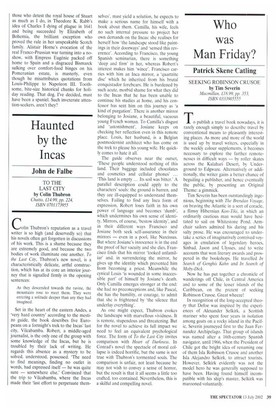Haunted by the Incas
John de Falbe
TO THE LAST CITY by Colin Thubron
Chatto, £14.99, pp. 224, ISBN 0701173955
Colin Thubron's reputation as a travel writer is so high (and deservedly so) that his novels often get forgotten in discussions of his work. This is a shame because they are extremely good, and because the two bodies of work illuminate one another. To the Last City, Thubron's new novel, is a characteristically delicate, artful construction, which has at its core an interior journey that is signalled firmly in the opening sentences:
As they descended towards the ravine, the mountains rose to meet them. They were entering a solitude deeper than any they had imagined.
Set in the heart of the eastern Andes, a 'very hard country' according to the mestizo guide, the book describes five Europeans on a fortnight's trek to the Incas' last city, Vilcabamba. Robert, a middle-aged journalist, is the only one of the group with some knowledge of the Incas, but he is troubled by their lack of writing. He regards this absence as a mystery to be solved, understood, possessed. 'The need to find meanings, finding no outlet in words, had expressed itself — he was quite sure — somewhere else.' Convinced that the trip to Vilcabamba, where the Incas made their 'last effort to perpetuate them selves', must yield a solution, he expects to make a serious name for himself with a book about them. Camilla, his wife, feels no such internal pressure to project her own demands on the Incas: she realises for herself how the landscape stood like paintings in their doorways' and 'sensed this reverence'. According to Francisco, the young Spanish seminarian, there is something 'deep and firm' in her, whereas Robert's interest makes him 'wince'. Francisco carries with him an Inca mirror, a 'quartzite disc' which he inherited from his brutal conquistador forebears. He is burdened by such acute, morbid shame for what they did to the Incas that he has been unable to continue his studies at home, and his confessor has sent him on this journey as a kind of purgation'. There is another mirror belonging to Josiane, a beautiful, vacuous young French woman. To Camilla's disgust and 'astonishment', Josiane keeps on checking her reflection even in this remote place. Louis, her husband, is a Belgian postmodernist architect who has come on the trek to please his young wife. He quickly comes to hate it all.
The guide observes near the outset, 'These people understood nothing of this land. Their baggage included chocolates and cosmetics and cellular phones' ... 'This land is empty ... Its soil was bitter.' A parallel description could apply to the characters' souls: the ground is barren, and they are ill-equipped to understand themselves. Failing to find any Inca form of expression, Robert loses faith in his own power of language and becomes 'dumb', which undermines his own sense of identity. Mirrors, of course, 'bestow identity', and in their different ways Francisco and Josiane both seek self-assurance in their mirrors — even in a pool, like Narcissus. But where Josiane's innocence is in the end the proof of her vacuity and she dies. Francisco finds that his mirror 'looked unfamiliar' and, in surrendering the mirror, he gives up the identity which prevented him from becoming a priest. Meanwhile the cynical Louis 'is wounded in some inaccessible part' of himself by Josiane's death. Only Camilla emerges stronger at the end: she had no preconceptions and, like Pascal, she has the humility, or courage, to admit that she is frightened by 'the silence that underlay everything'.
As one might expect, Thubron evokes the landscape with marvellous vividness. It is remote, stupendous and threatening. But for the novel to achieve its full impact we need to feel an equivalent psychological force. The form of To the Last City invites comparison with Heart of Darkness. In Conrad's novel the spectacle of moral collapse is indeed horrific, but the same is not true with Thubron's tormented souls. The comparison is unfair, not least because he may not wish to convey a sense of horror, but the result is that it all seems a little too crafted, too contained. Nevertheless, this is a skilful and compelling novel.


































































 Previous page
Previous page